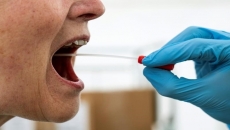Temporary foreign workers will no longer be totally exempt from mandatory hotel quarantines imposed on all incoming non-essential travellers, the federal government announced Tuesday.
The new rules are among several adjustments to the management of the program for the start of this year's growing season.
“We are doing everything necessary so they can arrive as scheduled and in a way that is safe for their health and the health of Canadians,” Agriculture Minister Marie-Claude Bibeau said in a statement Tuesday.
The health and safety of temporary foreign workers is a key priority for our government. Today we announced next steps on quarantine requirements and enhanced actions to better protect TFWs and employers. ⤵️https://t.co/3XG4soVHN0
— Carla Qualtrough (@CQualtro) March 16, 2021
Temporary foreign workers were initially excluded when mandatory hotel quarantines for incoming travellers went into effect last month, though the government had signalled there might be changes.
The result is a two-pronged approach, unveiled Tuesday.
Incoming workers who are asymptomatic will be tested upon arrival, but then can go direct to their quarantine locations if they have private transportation and are accompanied only by others who came with them to Canada.
But workers who were relying on public transportation will have to stay in government-approved hotels to wait for the results of their COVID-19 tests. If they test negative, they will be allowed to move on as long as they have suitable quarantine plans.
Employers will be required to book the rooms using the same system as non-essential travellers do now.
In a release outlining the new approach, the government said it "intends to ensure employers and TFWs will not assume incremental costs associated with the three-day quarantine requirement at the point of entry."
All arriving workers must quarantine for the full 14 days, and employers are responsible for paying those costs as well as paying the workers for the time.
Outbreaks at farms and processing plants were hallmarks of the first wave of the COVID-19 pandemic in Canada and the government further committed Tuesday to increasing oversight of the program to keep workers and Canadians safer from the spread of the novel coronavirus.
That includes increasing the number of employer-compliance inspections, more funding to migrant-worker groups to assist with outreach, and improving a tip line for workers to report problems.






